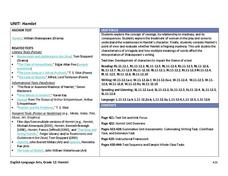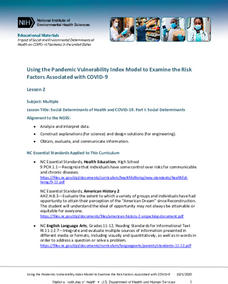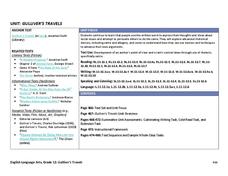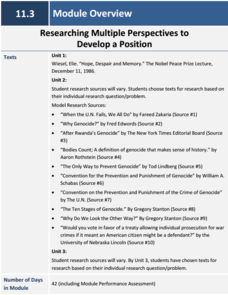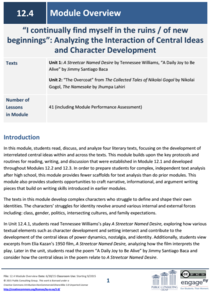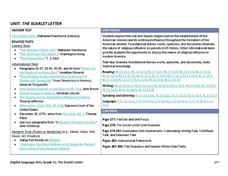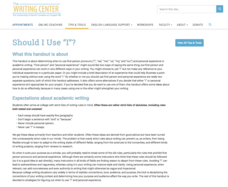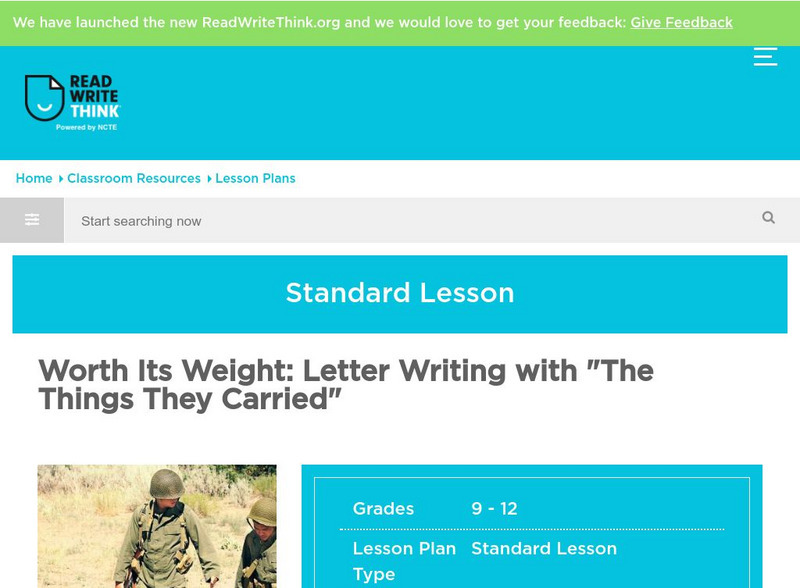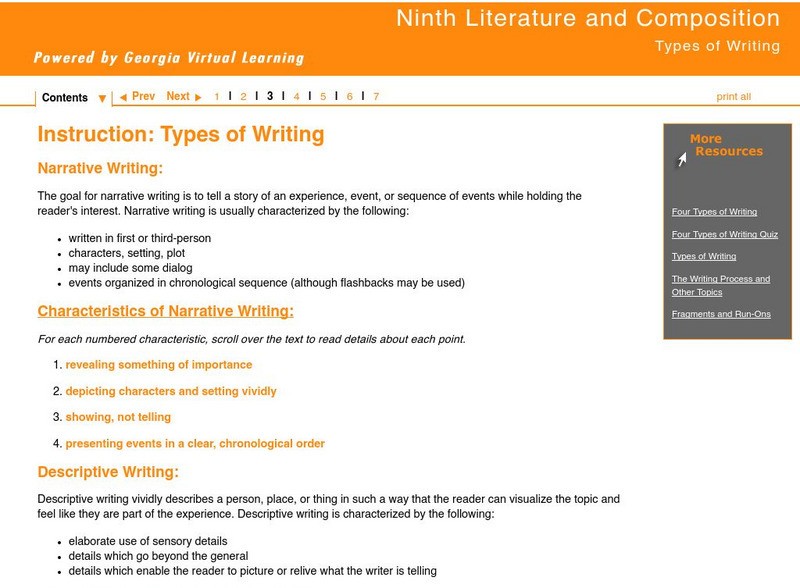Project Tahoe
Individual Rights vs. The Greater Good Within the Scope of War
When, if ever, is the government justified in restricting individual rights? When, if ever, should the "greater good" trump individual rights? To prepare to discuss this hot-button topic, class members examine primary source documents,...
PBS
Who, Me? Biased?: Understanding Implicit Bias
A 10-page interactive explains different facets of implicit bias, demonstrates how implicit bias works, and how people can counteract its effects. The interactive tools permit users to save their information in "My Work" folders, to take...
Louisiana Department of Education
Unit: Hamlet
Encourage readers to determine if Hamlet's madness is actually divinest sense. Class members analyze the words of the play before studying related texts, including T.S. Eliot's "The Love Song of J. Alfred Prufrock," scenes from...
Facing History and Ourselves
Civil Rights Historical Investigations
The murder of Emmett Till, the Selma to Montgomery march, and the desegregation of Boston schools are the focus of three units that ask class members to investigate why these events were so key in the struggle for civil rights....
Shakespeare Uncovered
Women’s Roles in As You Like It
“There is nothing that becommeth a maid better than soberness, silence, shamefastness, and chastity, both of body & mind.” This line, from Thomas Bentley ‘s The Monument of Matrons published in 1582, typifies the way women were...
Curated OER
Expressing Your Views to the Letter
Analyze the motivation, purpose, and value of letters to the editor by examining letters written in response to the violence at Columbine High School. For homework, middle and high schoolers write their own letters to the editor about an...
Common Sense Media
My Online Code
Approach ethical online behavior with a series of activities geared toward teaching pupils about digital citizenship. After a brief discussion about ethics, small groups inspect a fictional social networking profile with ethics in mind....
Academy of American Poets
Poems about Poetry
Learners of all ages hear the words “Today we’re going to start poetry” and begin their plans to drop out of school. It is not the teacher's fault! Use this resource to help young scholars understand the genre of poetry and why it is...
ReadWriteThink
Heroes Are Made of This: Studying the Character of Heroes
What makes heroes and villains? A six-part unit plan asks young scholars to explore the concept of heroism and the characteristics they consider heroic and unheroic. Groups create character maps that focus on how characters are shaped by...
National Institute of Environmental Health Sciences
Lesson 2: Using the Pandemic Vulnerability Index Model to Examine the Risk Factors Associated with COVID-19
A lesson asks young mathematicians to investigate the social determinants and the environmental factors that influence risk factors associated with the spread of COVID-19. Class members then brainstorm what they can do to alleviate the...
Thoughtful Learning
Adjusting Your Writing Voice
"Yo, what's up?" "Nuttin!" While such a dialogue might be appropriate between friends, it would be ill-advised in more formal situations. A mini-lesson asks young writers to consider how to adjust the voice they use to bring their...
ReadWriteThink
Designing Museum Exhibits for The Grapes of Wrath: A Multigenre Project
Challenge readers of John Steinbeck's The Grapes of Wrath to create a museum exhibit that uses artifacts to focus on one issue raised by the award winning story of the Great Depression, the Dust Bowl, and the Joads.
Louisiana Department of Education
Gulliver’s Travels
Gulliver's Travels tells the story of a man who goes on voyages and encounters strange people. A unit plan introduces readers to the classic text, as well as excerpts from other examples of sarcasm and satire, such as "A Modest...
EngageNY
Grade 11 ELA Module 3: Researching Multiple Perspectives to Develop a Position
The only way that a heinous act of genocide can succeed is if citizens of surrounding groups and countries turn their backs on those suffering. A thorough language arts module addresses shared central ideas with three separate units,...
EngageNY
Grade 12 ELA Module 4: Literary Analysis
Does identity come from within, or do external forces shape it? Explore the complex identity concept with a two-unit module for 12th-grade language arts. The first unit uses A Streetcar Named Desire by Tennessee Williams and "A Daily Joy...
EngageNY
Grade 12 ELA Module 3
Gun, Germs, and Steel by Jared Diamond is a seminal work of historical nonfiction from the late 20th century. Use the author's claims and supporting evidence to guide your high school seniors through their research project, culminating...
Louisiana Department of Education
The Scarlet Letter
Use Nathanial Hawthorne's immortal text on the influence of religion on the early American settlements, as well as its continued impact on American culture, with a unit that focuses on The Scarlet Letter. In addition to Hawthorne's...
Curated OER
Formal versus Informal Language
Engage in an activity that focuses on the concepts of formal and informal language use. Middle and high schoolers compare and contrast each style by using a Venn diagram that includes some examples. They read and hear a passage of lyrics...
Curated OER
Propaganda
How does word choice affect the reading of a text? Compare two headlines that were written about the same event. Is one biased? Discuss how word choice often reveals the author's feelings about a topic. Then look at different techniques...
Curated OER
Prose Styles: Tough, Sweet, and Stuffy
Take a walk on the rhetorical side with this presentation, which discusses three styles of prose: tough (ethos), sweet (pathos), and stuffy (logos). The slide show provides thorough definitions and examples of each style, as well as...
University of North Carolina
Should I Use “I”?
Despite the formal nature of academic writing, personal pronouns frequently appear in high school and college papers. While your first instinct may be to cross them out, sometimes it's okay to use them, an idea covered in a handout that...
University of Wisconsin
University of Wisconsin: Writing Center: Academic and Professional Writing
The section on Common Types of Writing Assignments is a particularly helpful piece of this site. Learn how to approach a wide variety of writing tasks from lab reports to literary reviews. Then use the rest of the site to learn how to...
ReadWriteThink
Read Write Think: Worth Its Weight Letter Writing With "The Things They Carried"
Contains plans for six lessons that use the Tim O'Brien's story "The Things They Carried" to teach about an author's style as well as letter writing. In addition to objectives and standards, this instructional plan contains links to...
Georgia Department of Education
Ga Virtual Learning: Ninth Literature and Composition: Types of Writing: Review
This lesson is a review of the unit on types of writing including purpose, audience, tone, the writing process, the four types of writing, and sentence fragments and run-ons. A quiz is provided.




